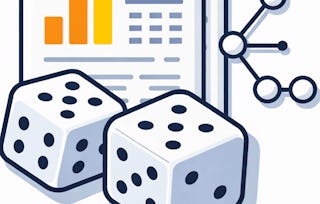Counting is one of the basic mathematically related tasks we encounter on a day to day basis. The main question here is the following. If we need to count something, can we do anything better than just counting all objects one by one? Do we need to create a list of all phone numbers to ensure that there are enough phone numbers for everyone? Is there a way to tell that our algorithm will run in a reasonable time before implementing and actually running it? All these questions are addressed by a mathematical field called Combinatorics.

Combinatorics and Probability

Combinatorics and Probability
This course is part of Introduction to Discrete Mathematics for Computer Science Specialization


Instructors: Владимир Подольский
48,260 already enrolled
Included with
869 reviews
Skills you'll gain
Details to know

Add to your LinkedIn profile
47 assignments
See how employees at top companies are mastering in-demand skills

Build your subject-matter expertise
- Learn new concepts from industry experts
- Gain a foundational understanding of a subject or tool
- Develop job-relevant skills with hands-on projects
- Earn a shareable career certificate

There are 6 modules in this course
Counting is one of the basic mathematically related tasks we encounter on a day to day basis. The main question here is the following: can we count the number of objects without listing all of them? This question arises naturally in various scenarios both in real life and in Computer Science. What is the number of different phone numbers or license plates? What is the number of different combinations one needs to brute force in order to crack a password? Is there a way to tell that an algorithm will run in a reasonable time before implementing and actually running it? All these questions are addressed by a mathematical field called combinatorics. In this module, we consider the basic building blocks of combinatorics. All of them are easy to understand and at the same time are powerful enough to handle various non-trivial questions. To help you to develop an intuition, we consider short Python code snippets for generating the objects to be counted.
What's included
13 readings11 assignments
In how many ways one can select a team of five students out of ten students? What is the number of non-negative integers with at most five digits whose digits are decreasing? In how many ways one can get from the bottom left cell to the top right cell of a 5x5 grid, each time going either up or to the right? And why all these three numbers are equal? We'll figure this out in this module!
What's included
8 videos4 readings6 assignments
We have already considered most of the standard settings in Combinatorics that allow us to address many counting problems. However, successful application of this knowledge on practice requires considerable experience in this kind of problems. In this module, we will address the final standard setting in our course, combinations with repetitions, and then we will gain some experience by discussing various problems in Combinatorics.
What's included
7 readings8 assignments
The word "probability" is used quite often in the everyday life. However, not always we can speak about probability as some number: for that a mathematical model is needed. What is this mathematical model (probability space)? How to compute probabilities (if the model is given)? How to judge whether the model is adequate? What is conditional probability and Bayes' theorem? How our plausible reasoning can be interpreted in terms of Bayes' theorem? In this module we cover these questions using some simple examples of probability spaces and real life sutiations.
What's included
17 videos4 readings11 assignments
In the previous module we discussed how to compute probabilities of random events. But in many practical situation we are interested not only in positive or negative outcome, but also in some quantitative characteristics of an outcome. Among these cases are number of steps of an algorithms, number of points that one can win in the games involving any kind of randomness, all quantitative characteristics of a random person in some group of people. Basically settings of this kind arise in all situations when (a) any kind of uncertainty is presented (b) we are interested in quantitative characteristics. The mathematical model for this is called random variables. And we will discuss them in this module.
What's included
8 readings10 assignments1 ungraded lab
In this module, we will apply accumulated knowledge to create a project solving a certain dice game. The game is very simple: two players pick a dice each from a given pool of dices with various numbers on their sides. Then each player throws his dice and the one with the greater number on his dice wins. The game looks very simple and it seems that it is very easy to play this game optimally once we know our pool of dices. Yet it turns out that this intuition is overwhelmingly wrong: the game turns out to be very counterintuitive. In this module we will discuss the game in detail and create a program that finds an optimal strategy to play the game on a given pool of dices.
What's included
2 readings1 assignment
Earn a career certificate
Add this credential to your LinkedIn profile, resume, or CV. Share it on social media and in your performance review.
Instructors


Offered by
Explore more from Algorithms
 Status: Free Trial
Status: Free TrialThe Hong Kong University of Science and Technology
 Status: Preview
Status: PreviewUniversity of Zurich
 Status: Free Trial
Status: Free TrialJohns Hopkins University
 Status: Free Trial
Status: Free TrialBirla Institute of Technology & Science, Pilani
Why people choose Coursera for their career

Felipe M.

Jennifer J.

Larry W.

Chaitanya A.
Learner reviews
- 5 stars
69.96%
- 4 stars
20.13%
- 3 stars
6.90%
- 2 stars
1.26%
- 1 star
1.72%
Showing 3 of 869
Reviewed on Jul 31, 2020
Great course. The final Project unclear had instructions on how to provide input. I spent a lot of time trying to troubleshoot it even though I already have a correct solution
Reviewed on Mar 1, 2018
Awesome course, good topics. Easy to get help. Some topics weren't that clear at first, but you'll eventually understand.
Reviewed on Sep 20, 2023
This whole specialization makes me regret not paying more attention in Math class. They teach math through games. One of the best courses I've taken on Coursera!

Open new doors with Coursera Plus
Unlimited access to 10,000+ world-class courses, hands-on projects, and job-ready certificate programs - all included in your subscription
Advance your career with an online degree
Earn a degree from world-class universities - 100% online
Join over 3,400 global companies that choose Coursera for Business
Upskill your employees to excel in the digital economy
Frequently asked questions
To access the course materials, assignments and to earn a Certificate, you will need to purchase the Certificate experience when you enroll in a course. You can try a Free Trial instead, or apply for Financial Aid. The course may offer 'Full Course, No Certificate' instead. This option lets you see all course materials, submit required assessments, and get a final grade. This also means that you will not be able to purchase a Certificate experience.
When you enroll in the course, you get access to all of the courses in the Specialization, and you earn a certificate when you complete the work. Your electronic Certificate will be added to your Accomplishments page - from there, you can print your Certificate or add it to your LinkedIn profile.
Yes. In select learning programs, you can apply for financial aid or a scholarship if you can’t afford the enrollment fee. If fin aid or scholarship is available for your learning program selection, you’ll find a link to apply on the description page.
More questions
Financial aid available,

